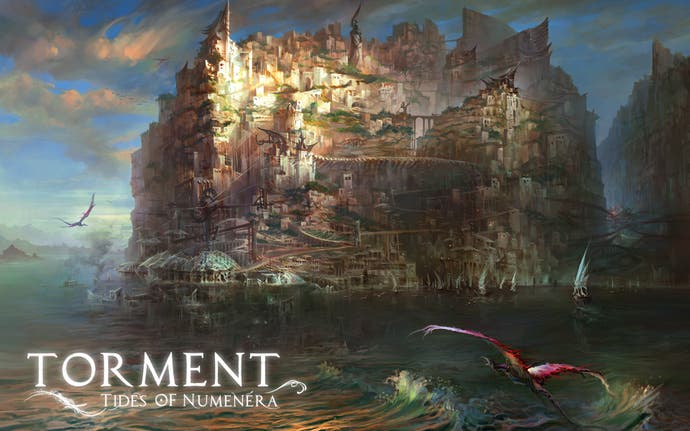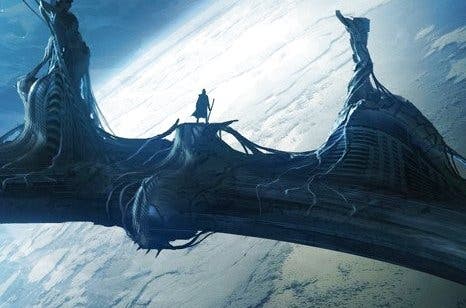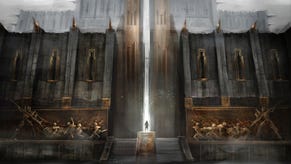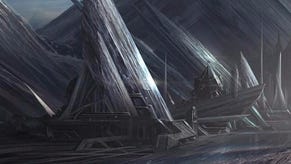Torment: Tides of Numenera is still worth getting excited for
The quiet Kickstarter champion that's still on course for this year.
It seems like a long time ago we got excited about Torment: Tides of Numenera, the record-breaking Kickstarter game. Things were quiet in gaming back then, and bringing back beloved old games in new ways was exciting. But the world has moved on, new consoles launched, and similar kinds of nostalgic Kickstarter games eventually came out. Excitement naturally died down.
But as I talk to Torment creative lead Colin McComb, I remember why I was excited. It's because Planescape: Torment was different - that's the old game this new Torment thematically succeeds. It was deep on a philosophical level. 'What can change the nature of a man?' it asked as it pondered humanity and existence. Sure it had Dungeons & Dragons rules and a weird multiple universe setting, but they were almost beside the point. Torment: Tides of Numenera follows a similar path. 'What does one life matter?' it asks.
You're the suddenly-awoken consciousness of a body just abandoned by the Changing God. He's inhabited thousands of bodies like yours over aeons, seeing all he can of life while outrunning a fear of death, manifesting as an ancient enemy called The Sorrow. It usually kills the bodies he leaves. But not you. Now you're a key part of a battle and world you don't understand, trying to find your way. Sound familiar? How you get to the bottom of it all will be your journey.
The new Torment, like the old, will try to do things differently. "Our morality system is called The Tides," McComb explains. "It doesn't map onto a good/evil/law/chaos kind of thing. It's more talking about is your legacy going to be one of passion, creation, art; or is it going to be rationality, knowledge and wisdom; or is it going to be serving the greater good or being a super-empathic character; or is it just about accruing power and fame?
"These Tides are essentially a psychic web of energy that you are drawing from. If you have a certain kind of Tide you can push that power out to people and bend them to your will. If you're dealing with people who are like-minded with you, you can push them into things that are more beneficial for you as well. If you're Silver Tide, which is the one about fame and power, and you're dealing with somebody who's avaricious and always trying to get ahead for herself, then you can push her into seeing things your way and she'll give up more easily without a fight.
"It's essentially a way to get around big fights, or to accrue benefits to yourself or to gain more power for yourself."
Tides were invented for the game. What developer inXile didn't invent was Numenera, the brand new role-playing universe also from Kickstarter. Whereas Dungeons & Dragons underpinned Planescape: Torment, Numenera will underpin Torment: Tides of Numenera. And that will make it feel "significantly" different.
The role-playing universe Numenera is "less a chess game and more a storytelling game", according to McComb. For Torment that means combat isn't the bread and butter of the experience - story is.
"We are not giving experience for killing stuff," McComb says. "Numenera is about exploration, it's not about killing people and taking their stuff. In a game where we say 'what does one life matter?', we actually want to make it matter." Not, "What does one life matter? Well, about 25XP!"
He goes on: "We have Crises and Tussles. A Crisis is a hand-crafted encounter, a major thing - a major set-piece. Then we've got Tussles for when you screw up a dialogue or get caught picking the wrong pocket. I don't want to call it a trash combat because hopefully it's all going to be entertaining and fun."
Character development is different, based around a literary-themed "adjective, noun, verb" idea. Take McComb's sentence, "I am a tough Glaive who bears a halo of fire," as an example.
"The adjective describes what your character does - you could be tough, you could be cunning, you could be cowardly, you could be dastardly. All of these things provide modifiers for your skills and your pools, which are Might, Speed and Intellect.
"Then you've got your noun, which is your class. You've got Glaives, which are like warriors; you've got Nanos, which are wizards, drawing on the powers of the ancients that have been left around the world here; then you've got Jacks, which are sort of a mix between the two. Some people think of them as thieves but they're really more warrior-mages - Jack of all trades.
"Then you've got your verb, which is your super-special cool power. It could be 'bears a halo of fire' or 'rides the lightning' or 'talks to machines'. And all of these things provide different special ways in which you interact with the world, and it's super-cool."

And the world of Numenera, futuristic but low-tech following the ruin of an advanced civilisation, will feel new. It will be dark and weird like Planescape: Torment but also bright, airy and colourful, judging by some of the art.
You'll recruit companions, which were a crucial element in Planescape: Torment, but there won't be many and you'll adventure in small parties. There's a chance, too, that your companions will die. In fact, based upon your actions, they could already be dead before you meet them.
"If you choose to seek out one companion earlier than another, then the other companion will be gone from where they are - they might be dead," says McComb. "Or they might be in a situation where you're going to have to work a whole lot harder to extricate them from it. Or they might be getting into something that can change the course of the story.
"We're looking at some really deep reactivity here on things that will change. It's not going to be just, 'Are you going to save the kitten in the burning building? Or are you going to come back two weeks later and save them then?'"
He adds: "A lot of people can perma-die. We can find some weird, hand-wavy explanation about why you can save people but there are certainly a number of options where people can perma-die."
Another reason to be excited is inXile, the developer, which already delivered Wasteland 2 - a nostalgic Kickstarted game - to a very high standard. The bulk of that team now works on Torment, a force that numbers around 25-30. That's a hefty workforce for a game like this. The budget has grown too, from $4.1m as of the end of the Kickstarter campaign up to $4.8m now.
There have been a couple of delays to Torment: Tides of Numenera but the end is finally in sight. The good news is it will "definitely" - read: hopefully - be out this year, according to McComb, although it sounds like there's still an awful lot of work to do. The official date is Q4 2015, but that's "probably late 2015" in actuality. There don't appear to be any plans for an Early Access release, but those who backed the game at the appropriate level will get access to an alpha systems test ahead of the game's full launch.
Torment: Tides of Numenera may seem like yesterday's news - heck, even yesterday's ideas - but it could defy expectations in 2015 just as Planescape: Torment did in 1999. There are plenty of reasons to be excited.
I speak to McComb as he announces he'll be at game show Rezzed 2015 in London next month giving a talk about narrative design and reactivity at 1pm Saturday, 14th March. Rezzed is an event organised by Eurogamer's parent company Gamer Network.










